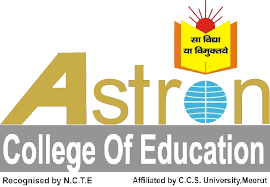ACE, Meerut Accreditation and Ranking
Astron College of Education (ACE, Meerut) institution is approved by the All India Council of Technical Education (AICTE), the National Council for Teacher Education (NCTE). Astron College of Education (ACE), situated in the vibrant city of Meerut, is a distinguished institution committed to nurturing future educators. This comprehensive overview aims to explore the various dimensions of ACE, including its recognition, accreditations, academic programs, faculty expertise, infrastructure, and initiatives aimed at student development.
Institutional Recognition
-
Affiliation with Chaudhary Charan Singh University: ACE is affiliated with Chaudhary Charan Singh University (CCSU), Meerut. This affiliation ensures that the academic programs offered align with the standards set by the university, enhancing the credibility of the degrees awarded.
-
Approval from NCTE: The institution holds approval from the National Council for Teacher Education (NCTE), a crucial recognition for an education-focused institution. NCTE approval ensures that ACE adheres to the norms and standards set by the national regulatory body for teacher education.
Accreditations and Quality Assurance
-
Quality Assurance Measures: ACE prioritizes quality assurance through regular assessments, feedback mechanisms, and continuous improvement initiatives. These measures are in place to maintain high academic standards and ensure a positive learning experience for students.
-
Potential Accreditation Bodies: While specific accreditation details are not provided, ACE may be affiliated with other accreditation bodies or educational quality assurance organizations. These affiliations contribute to the institution's commitment to delivering quality education.
Academic Programs and Curriculum Excellence
-
B.Ed. and D.El.Ed Programs: ACE offers Bachelor of Education (B.Ed.) and Diploma in Elementary Education (D.El.Ed) programs. These courses are designed to equip future educators with the necessary skills and knowledge for effective teaching.
-
Pedagogically Sound Curriculum: The institution is likely to have a pedagogically sound curriculum, focusing on the latest trends and methodologies in education. Continuous updates ensure that the content remains relevant and meets the evolving needs of the education sector.
Faculty Expertise and Research Initiatives
-
Qualified and Experienced Faculty: ACE prides itself on having a faculty comprising qualified and experienced educators. The faculty's rich blend of academic and practical experience contributes to a robust learning environment.
-
Research Culture: While specific details about research initiatives are not provided, ACE may foster a research culture among its faculty. Encouraging research contributes to the intellectual growth of both faculty members and students.
Infrastructure and Learning Resources
-
Modern Classrooms and Educational Technology: The institution invests in modern classrooms equipped with educational technology to enhance the teaching and learning experience. This includes audio-visual aids and other tools that facilitate effective instruction.
-
Resourceful Library: ACE likely maintains a resourceful library with a diverse collection of books, journals, and digital resources. Access to such resources is essential for academic research and enhancing the learning experience.
Student Engagement and Extracurricular Activities
-
Student-Centric Approach: ACE follows a student-centric approach, ensuring that students are actively engaged in the learning process. This approach may involve participatory teaching methods and interactive sessions.
-
Participation in Educational Events: The institution encourages students to participate in educational events, workshops, and seminars. Such participation exposes students to broader perspectives and emerging trends in the field of education.
Internship Opportunities and Skill Development
-
Practical Exposure through Internships: ACE facilitates internships for students, providing them with practical exposure to the teaching profession. Internships are crucial for applying theoretical knowledge in real-world educational settings.
-
Skill Development Programs: Beyond academic knowledge, ACE likely conducts skill development programs. These programs focus on honing the soft skills and pedagogical techniques essential for effective teaching.
Placement Programs and Industry Connections
-
Placement Assistance for Aspiring Educators: While traditional placement may not be the primary focus for teacher education institutions, ACE may provide placement assistance for students seeking teaching positions. This could include guidance on job applications and interviews.
-
Networking with Schools and Educational Institutions: The institution may have established connections with schools and educational institutions, providing students with networking opportunities. Collaborations with the broader education community contribute to a more comprehensive learning experience.
Global Exposure and Collaborative Programs
-
International Collaborations: ACE may explore international collaborations with educational institutions abroad. Such collaborations could include exchange programs, joint research initiatives, or collaborative projects to enhance global perspectives.
-
Global Learning Opportunities: Opportunities for global exposure may be provided through study tours, international conferences, or collaborative programs. These experiences contribute to a well-rounded education, exposing students to diverse educational systems.
Community Engagement and Social Responsibility
-
Community Outreach Programs: ACE likely engages in community outreach programs, emphasizing the importance of educators in community development. Initiatives may include educational awareness campaigns or volunteering in local educational projects.
-
Emphasis on Social Responsibility: The institution may instill a sense of social responsibility in its students, encouraging them to use their education for the betterment of society. This could include initiatives related to education for underprivileged communities.

 Meerut, Uttar Pradesh
Meerut, Uttar Pradesh
 Collage
Collage
 2002
2002
 AICTE, NCTE
AICTE, NCTE




 back
back